Vulcan Materials Bundle
Who Really Controls Vulcan Materials Company?
Unraveling the ownership of Vulcan Materials Company is key to understanding its future. From its humble beginnings as Birmingham Slag Company in 1909 to its current status as a construction materials giant, the company's ownership has undergone a significant transformation. Knowing Vulcan Materials SWOT Analysis can help you understand the company's strategic direction.
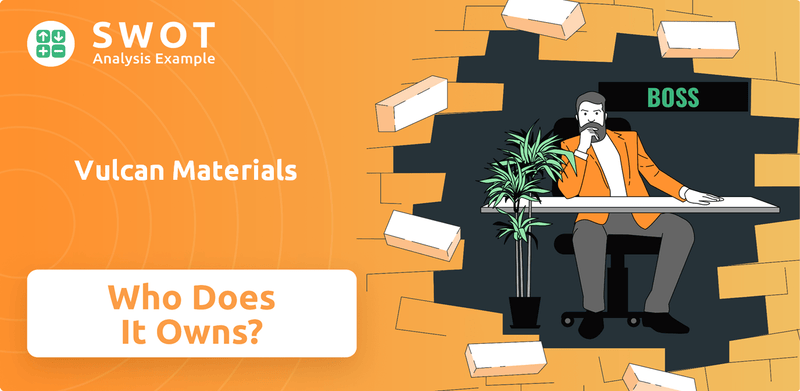
As a major player in the construction industry, understanding who owns Vulcan Materials, including its major shareholders and the influence of its board, is vital. Its market capitalization of approximately $35 billion as of June 2025 reflects its substantial market presence. This analysis will explore the evolution of Vulcan Materials ownership, providing insights for investors and stakeholders alike, including how to buy Vulcan Materials stock.
Who Founded Vulcan Materials?
The story of Vulcan Materials Company began in 1909 with the establishment of Birmingham Slag Company. Henry Badham and Solon Jacobs were the founders, and they saw potential in repurposing slag, a byproduct of steelmaking. This innovative approach led to the creation of construction materials, setting the stage for the company's future.
In 1916, Charles Lincoln Ireland acquired Birmingham Slag. He then entrusted the management to his sons, Glenn, Eugene, and Barney Ireland. Under their guidance, the company expanded significantly, opening new plants and acquiring sand and gravel pits across the Southeast. This expansion was crucial in establishing the company's presence in the construction materials market.
Although specific ownership details from the early days aren't readily available, the company remained family-owned for many years. It even managed to stay profitable during tough economic times like the Great Depression. By 1951, Birmingham Slag was showing strong financial performance, with annual net profits between $1.5 million and $2 million on sales exceeding $20 million. This success highlighted the company's resilience and strategic positioning.
The evolution of Vulcan Materials ownership is marked by key events and leadership transitions. The company's early years were defined by family ownership and strategic expansions. The need for increased capital and estate planning considerations eventually led to a shift in the company's ownership structure.
- 1909: Birmingham Slag Company founded by Henry Badham and Solon Jacobs.
- 1916: Charles Lincoln Ireland acquires Birmingham Slag.
- 1951: Charles W. Ireland becomes president, recognizing the need for capital.
- Mid-20th Century: The company's ownership structure evolves to address capital needs and inheritance tax issues, paving the way for a public listing.
Vulcan Materials SWOT Analysis
- Complete SWOT Breakdown
- Fully Customizable
- Editable in Excel & Word
- Professional Formatting
- Investor-Ready Format
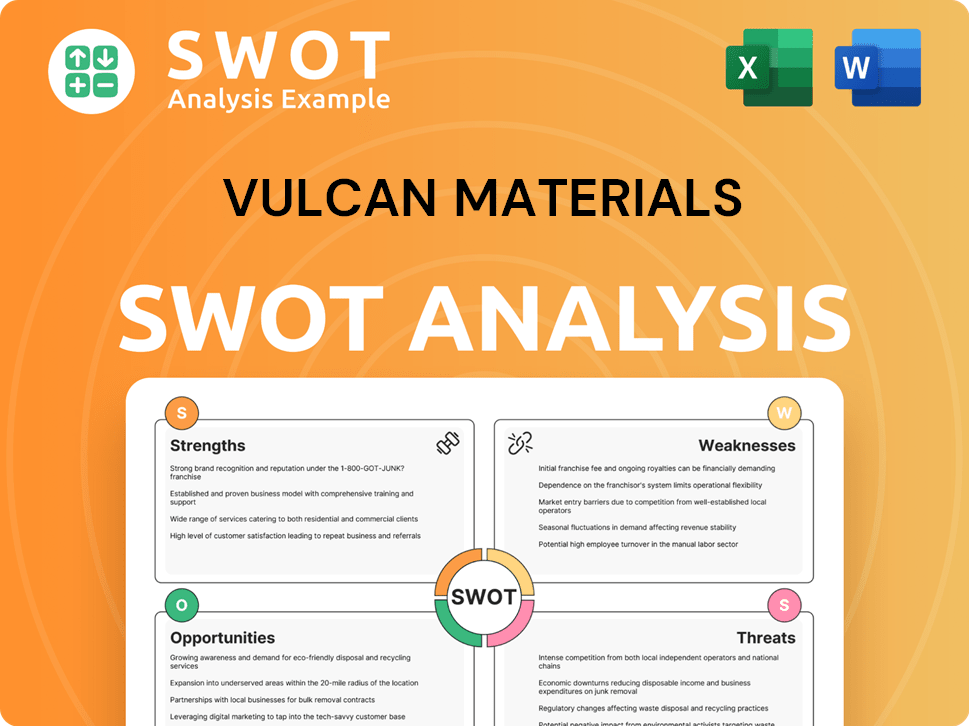
How Has Vulcan Materials’s Ownership Changed Over Time?
The transformation of Vulcan Materials Company's ownership began in 1956. Birmingham Slag Company merged with Vulcan Detinning Company. This strategic move, orchestrated by Bernard A. Monaghan, allowed Birmingham Slag to go public. The combined entity, renamed Vulcan Materials Company, began trading on the New York Stock Exchange on January 2, 1957. This pivotal event opened doors to capital markets, fueling rapid expansion and acquisitions. In the years immediately following its initial public offering (IPO), Vulcan's financial performance saw significant growth, with revenues increasing substantially.
The company's growth was further accelerated by strategic acquisitions. The initial public offering (IPO) provided the necessary capital to acquire numerous family-owned quarries. This expansion strategy was a key driver of the company's early success. The ability to access capital markets was essential for funding these acquisitions and supporting the company's growth trajectory. This early period established the foundation for Vulcan Materials Company's future as a major player in the construction materials industry.
| Year | Event | Impact |
|---|---|---|
| 1956 | Birmingham Slag merges with Vulcan Detinning | Facilitates going public; access to capital markets. |
| January 2, 1957 | Vulcan Materials Company begins trading on NYSE | Provides platform for expansion and acquisitions. |
| 1956-1959 | Rapid revenue growth through acquisitions | Demonstrates effectiveness of capital allocation and expansion strategy. |
As of April 2025, the ownership of Vulcan Materials Company is largely institutional. Institutional investors hold approximately 93.19% of the company's stock, while insider holdings remain at 0.14%. Mutual funds have increased their holdings from 75.84% to 76.13% in April 2025. Major institutional shareholders include The Vanguard Group, Inc., BlackRock, Inc., and State Street Global Advisors, Inc. This ownership structure influences the company's strategy and governance. The company's focus on disciplined capital allocation, as highlighted in its 2024 annual report, reflects the influence of its current ownership structure. For more insights into the company's strategic direction, consider reading about the Growth Strategy of Vulcan Materials.
The ownership of Vulcan Materials Company has evolved significantly since its inception, transitioning from a merger to a publicly traded entity. The current ownership is dominated by institutional investors.
- Institutional investors hold the majority of VMC stock.
- The company's strategy is influenced by its major shareholders.
- The IPO in 1957 was a pivotal moment in the company's history.
- Vulcan Materials Company's financial performance is closely watched by investors.
Vulcan Materials PESTLE Analysis
- Covers All 6 PESTLE Categories
- No Research Needed – Save Hours of Work
- Built by Experts, Trusted by Consultants
- Instant Download, Ready to Use
- 100% Editable, Fully Customizable
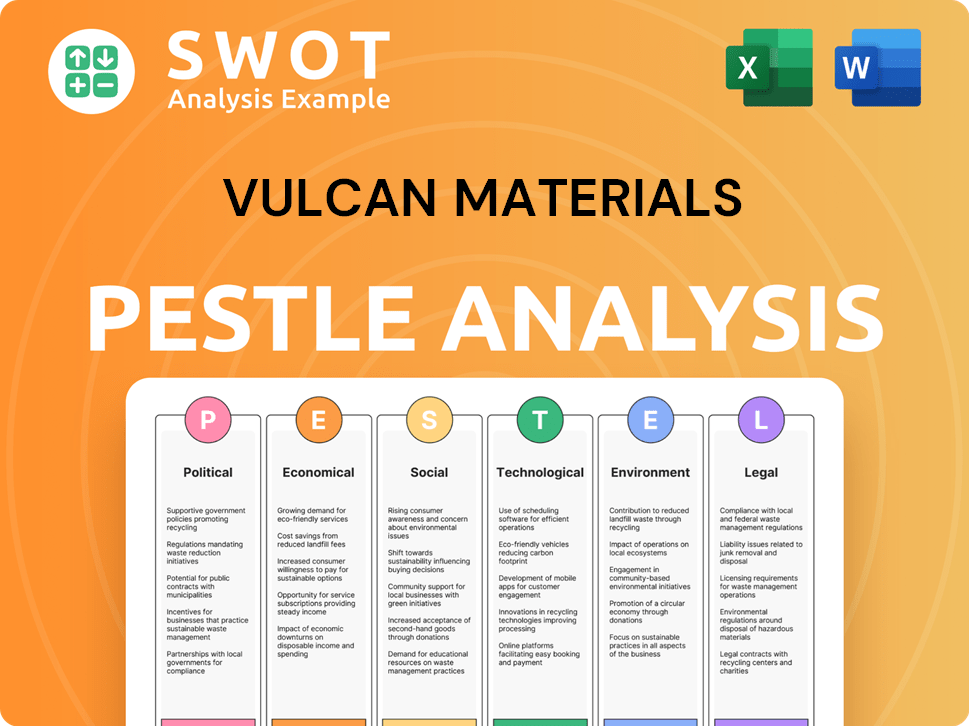
Who Sits on Vulcan Materials’s Board?
The current Board of Directors of Vulcan Materials Company plays a vital role in overseeing the company's strategic direction and governance. As of March 2024, the Board comprises several directors, with all except the Chairman and CEO, J. Thomas Hill, being independent. The Board is structured into three classes, with the term of office for one class expiring each year. The company's 2025 proxy statement, distributed around March 24, 2025, offers comprehensive details on the Board's composition, structure, tenure, and compensation.
Key figures on the Board include J. Thomas Hill, who serves as Chairman of the Board and Chief Executive Officer, a position he has held since July 2014 as CEO and December 2015 as Chairman. Other directors include Melissa H. Anderson, Thomas A. Fanning, O. B. Grayson Hall, Jr., Cynthia L. Hostetler, Lydia H. Kennard, Richard T. O'Brien, Kathleen L. Quirk, and George Willis. Understanding the board's structure is crucial for anyone looking into Vulcan Materials ownership and its impact on the company's performance.
| Board Member | Position | Since |
|---|---|---|
| J. Thomas Hill | Chairman & CEO | 2014 (CEO), 2015 (Chairman) |
| Melissa H. Anderson | Director | N/A |
| Thomas A. Fanning | Director | N/A |
Regarding the voting structure, holders of common stock are entitled to one vote per share on all matters presented to shareholders. The company's bylaws do not allow for cumulative voting. The certificate of incorporation includes a 'fair price' provision, requiring an affirmative vote of at least 80% of the voting stock for specific business combinations involving an 'Interested Shareholder' (defined as someone owning at least 10% of the aggregate voting power). Shareholders can vote online, by telephone, or by mail for annual meetings. The company's governance practices, including the Board's composition and independent oversight, are detailed in its 2024 Sustainability Report and 2025 Proxy Statement. This information is essential for anyone researching Who owns Vulcan Materials.
The voting structure grants one vote per share, with no cumulative voting. A 'fair price' provision requires an 80% vote for certain transactions.
- Shareholders vote on key decisions.
- Independent directors ensure oversight.
- Governance detailed in reports.
- Understanding voting rights is key for investors.
Vulcan Materials Business Model Canvas
- Complete 9-Block Business Model Canvas
- Effortlessly Communicate Your Business Strategy
- Investor-Ready BMC Format
- 100% Editable and Customizable
- Clear and Structured Layout
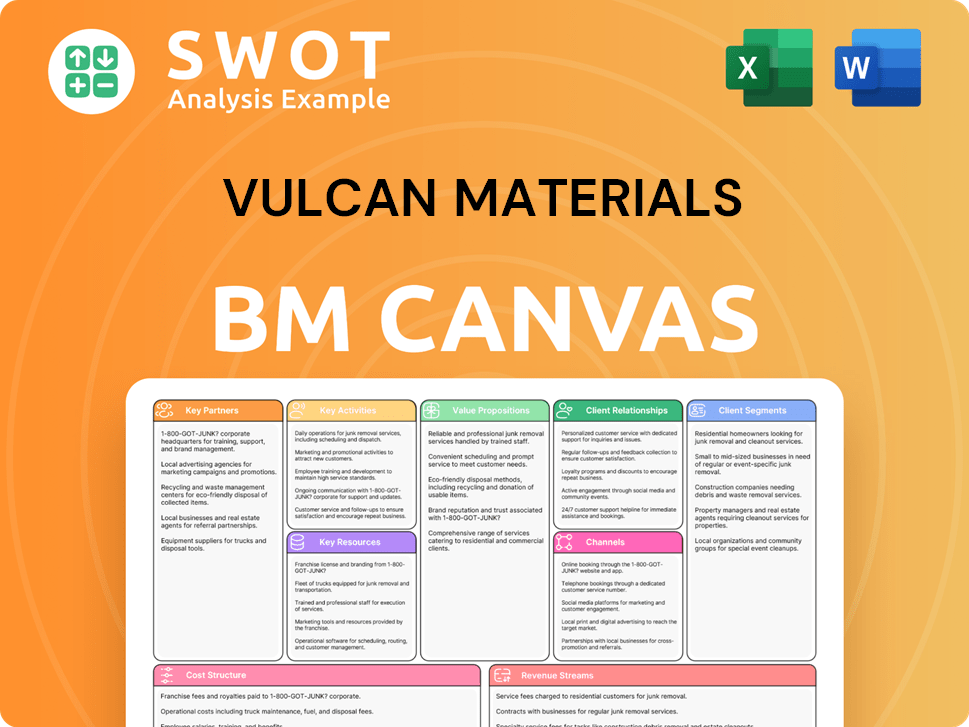
What Recent Changes Have Shaped Vulcan Materials’s Ownership Landscape?
Over the past few years, Vulcan Materials Company has focused on strategic acquisitions and capital allocation. In 2024, the company completed several acquisitions, including Wake Stone Corporation and Superior Ready Mix Concrete. These moves align with Vulcan's growth strategy, adding quality reserves and expanding its footprint in key markets. The company is a public company, and its stock trades under the symbol VMC.
In 2024, Vulcan returned $313 million to shareholders through dividends and stock repurchases. The company repurchased $125 million worth of shares in the fourth quarter of 2024 and plans to buy back $300 million worth of shares in 2025. As of March 2025, the 6-Month Share Buyback Ratio was -0.03%, and the 3-Year Share Buyback Ratio was 0.20%. These actions reflect the company's commitment to shareholder value. The company's headquarters are located in Birmingham, Alabama.
| Metric | Value | Year |
|---|---|---|
| Shares Repurchased (Q4) | $125 million | 2024 |
| Share Buyback (Planned) | $300 million | 2025 |
| Net Earnings (Forecast) | $1.01 - $1.17 billion | 2025 |
Leadership changes include Thompson Baker's promotion to President in October 2023 and Ronnie A. Pruitt's promotion to Chief Operating Officer, both reporting to Chairman and CEO Tom Hill. Industry trends indicate continued consolidation in the aggregates sector. Management anticipates high-single-digit price growth for FY2025, supported by demand recovery. The company forecasts net earnings between $1.01 billion and $1.17 billion for 2025. You can find more information on Vulcan Materials Company's investor relations on their website.
Vulcan Materials has expanded its reach through strategic acquisitions. Key acquisitions include Wake Stone Corporation and Superior Ready Mix Concrete. These acquisitions are part of Vulcan's growth strategy.
The company returns value to shareholders through dividends and share repurchases. In 2024, Vulcan returned $313 million to shareholders. Share buybacks are planned for 2025.
Leadership changes have been implemented to enhance execution. The company anticipates high-single-digit price growth for FY2025. The company's focus remains on aggregates-led growth.
Vulcan Materials forecasts net earnings between $1.01 billion and $1.17 billion for 2025. The company's financial performance is a key indicator of its success. The company's stock symbol is VMC.
Vulcan Materials Porter's Five Forces Analysis
- Covers All 5 Competitive Forces in Detail
- Structured for Consultants, Students, and Founders
- 100% Editable in Microsoft Word & Excel
- Instant Digital Download – Use Immediately
- Compatible with Mac & PC – Fully Unlocked
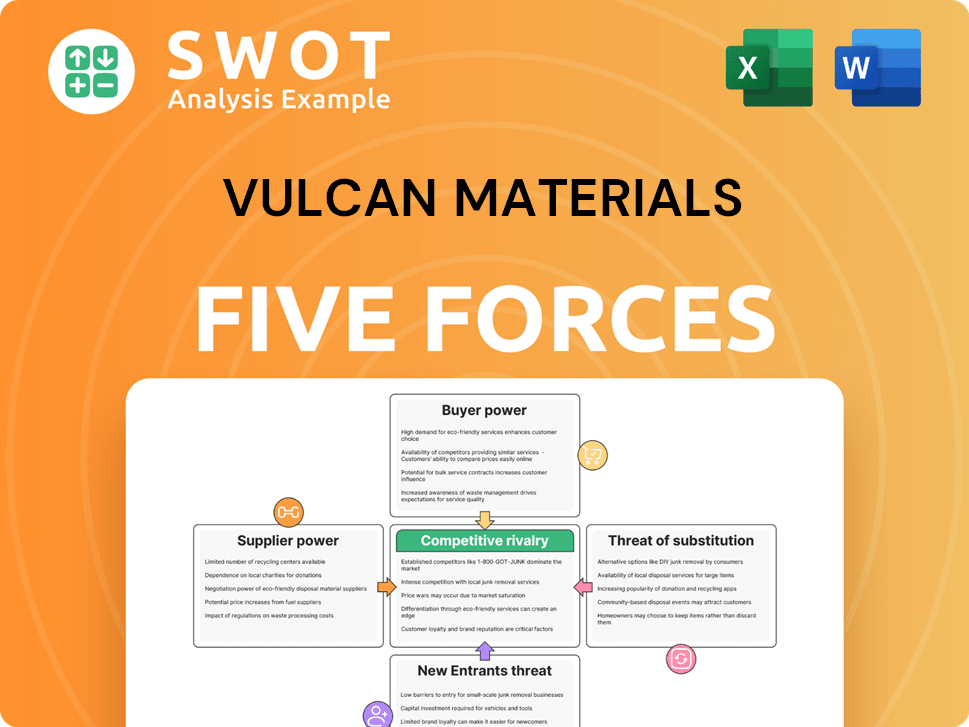
Related Blogs
- What are Mission Vision & Core Values of Vulcan Materials Company?
- What is Competitive Landscape of Vulcan Materials Company?
- What is Growth Strategy and Future Prospects of Vulcan Materials Company?
- How Does Vulcan Materials Company Work?
- What is Sales and Marketing Strategy of Vulcan Materials Company?
- What is Brief History of Vulcan Materials Company?
- What is Customer Demographics and Target Market of Vulcan Materials Company?
Disclaimer
All information, articles, and product details provided on this website are for general informational and educational purposes only. We do not claim any ownership over, nor do we intend to infringe upon, any trademarks, copyrights, logos, brand names, or other intellectual property mentioned or depicted on this site. Such intellectual property remains the property of its respective owners, and any references here are made solely for identification or informational purposes, without implying any affiliation, endorsement, or partnership.
We make no representations or warranties, express or implied, regarding the accuracy, completeness, or suitability of any content or products presented. Nothing on this website should be construed as legal, tax, investment, financial, medical, or other professional advice. In addition, no part of this site—including articles or product references—constitutes a solicitation, recommendation, endorsement, advertisement, or offer to buy or sell any securities, franchises, or other financial instruments, particularly in jurisdictions where such activity would be unlawful.
All content is of a general nature and may not address the specific circumstances of any individual or entity. It is not a substitute for professional advice or services. Any actions you take based on the information provided here are strictly at your own risk. You accept full responsibility for any decisions or outcomes arising from your use of this website and agree to release us from any liability in connection with your use of, or reliance upon, the content or products found herein.